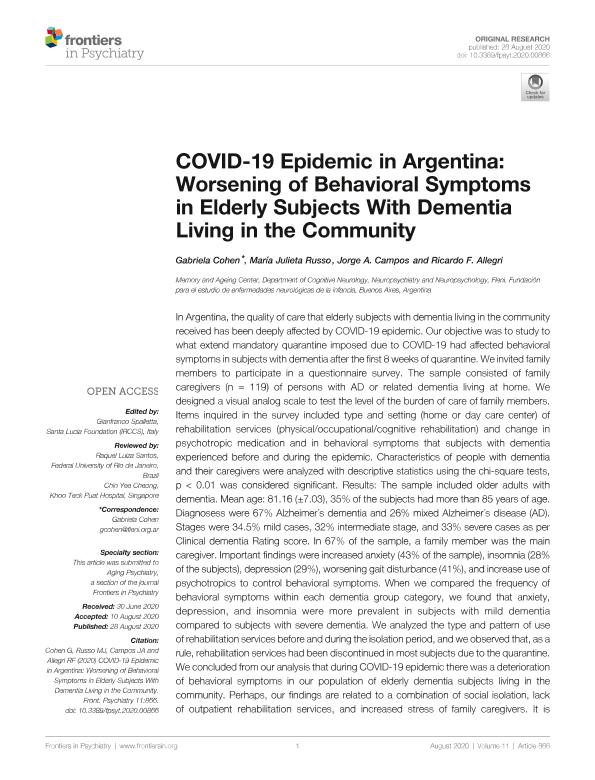Mostrar el registro sencillo del ítem
dc.contributor.author
Cohen, Gabriela
dc.contributor.author
Russo, María Julieta

dc.contributor.author
Campos Tapia, Jorge Andrés

dc.contributor.author
Allegri, Ricardo Francisco

dc.date.available
2020-10-29T19:50:17Z
dc.date.issued
2020-08
dc.identifier.citation
Cohen, Gabriela; Russo, María Julieta; Campos Tapia, Jorge Andrés; Allegri, Ricardo Francisco; COVID-19 Epidemic in Argentina: Worsening of Behavioral Symptoms in Elderly Subjects With Dementia Living in the Community; Frontiers Media S.A.; Frontiers in Psychiatry; 11; 8-2020; 1-10
dc.identifier.issn
1664-0640
dc.identifier.uri
http://hdl.handle.net/11336/117186
dc.description.abstract
In Argentina, the quality of care that elderly subjects with dementia living in the community received has been deeply affected by COVID-19 epidemic. Our objective was to study to what extend mandatory quarantine imposed due to COVID-19 had affected behavioral symptoms in subjects with dementia after the first 8 weeks of quarantine. We invited family members to participate in a questionnaire survey. The sample consisted of family caregivers (n = 119) of persons with AD or related dementia living at home. We designed a visual analog scale to test the level of the burden of care of family members. Items inquired in the survey included type and setting (home or day care center) of rehabilitation services (physical/occupational/cognitive rehabilitation) and change in psychotropic medication and in behavioral symptoms that subjects with dementia experienced before and during the epidemic. Characteristics of people with dementia and their caregivers were analyzed with descriptive statistics using the chi-square tests, p < 0.01 was considered significant. Results: The sample included older adults with dementia. Mean age: 81.16 (±7.03), 35% of the subjects had more than 85 years of age. Diagnosess were 67% Alzheimer´s dementia and 26% mixed Alzheimer´s disease (AD). Stages were 34.5% mild cases, 32% intermediate stage, and 33% severe cases as per Clinical dementia Rating score. In 67% of the sample, a family member was the main caregiver. Important findings were increased anxiety (43% of the sample), insomnia (28% of the subjects), depression (29%), worsening gait disturbance (41%), and increase use of psychotropics to control behavioral symptoms. When we compared the frequency of behavioral symptoms within each dementia group category, we found that anxiety, depression, and insomnia were more prevalent in subjects with mild dementia compared to subjects with severe dementia. We analyzed the type and pattern of use of rehabilitation services before and during the isolation period, and we observed that, as a rule, rehabilitation services had been discontinued in most subjects due to the quarantine. We concluded from our analysis that during COVID-19 epidemic there was a deterioration of behavioral symptoms in our population of elderly dementia subjects living in the community. Perhaps, our findings are related to a combination of social isolation, lack of outpatient rehabilitation services, and increased stress of family caregivers. It is necessary to develop a plan of action to help dementia subjects deal with the increased stress that this epidemic imposed on them.
dc.format
application/pdf
dc.language.iso
eng
dc.publisher
Frontiers Media S.A.

dc.rights
info:eu-repo/semantics/openAccess
dc.rights.uri
https://creativecommons.org/licenses/by/2.5/ar/
dc.subject
BEHAVIORAL SYMPTOMS
dc.subject
COVID-19 EPIDEMIC
dc.subject
DEMENTIA
dc.subject
ELDERLY
dc.subject
QUARANTINE
dc.subject
COVID-19
dc.subject.classification
Neurología Clínica

dc.subject.classification
Medicina Clínica

dc.subject.classification
CIENCIAS MÉDICAS Y DE LA SALUD

dc.title
COVID-19 Epidemic in Argentina: Worsening of Behavioral Symptoms in Elderly Subjects With Dementia Living in the Community
dc.type
info:eu-repo/semantics/article
dc.type
info:ar-repo/semantics/artículo
dc.type
info:eu-repo/semantics/publishedVersion
dc.date.updated
2020-10-29T19:09:51Z
dc.journal.volume
11
dc.journal.pagination
1-10
dc.journal.pais
Estados Unidos

dc.description.fil
Fil: Cohen, Gabriela. Fundación para la Lucha contra las Enfermedades Neurológicas de la Infancia; Argentina
dc.description.fil
Fil: Russo, María Julieta. Fundación para la Lucha contra las Enfermedades Neurológicas de la Infancia; Argentina
dc.description.fil
Fil: Campos Tapia, Jorge Andrés. Fundación para la Lucha contra las Enfermedades Neurológicas de la Infancia; Argentina
dc.description.fil
Fil: Allegri, Ricardo Francisco. Fundación para la Lucha contra las Enfermedades Neurológicas de la Infancia; Argentina. Consejo Nacional de Investigaciones Científicas y Técnicas; Argentina
dc.journal.title
Frontiers in Psychiatry
dc.relation.alternativeid
info:eu-repo/semantics/altIdentifier/doi/http://dx.doi.org/10.3389/fpsyt.2020.00866
dc.relation.alternativeid
info:eu-repo/semantics/altIdentifier/url/https://www.frontiersin.org/articles/10.3389/fpsyt.2020.00866/full
Archivos asociados
